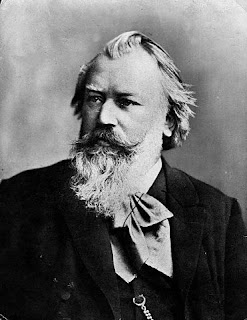Information
Composer: Johannes Brahms
- String Quartet No. 3 in B flat major, Op. 67: I. Vivace
- String Quartet No. 3 in B flat major, Op. 67: II. Andante
- String Quartet No. 3 in B flat major, Op. 67: III. Agitato, Allegretto non troppo
- String Quartet No. 3 in B flat major, Op. 67: IV. Poco allegretto con variazioni
- String Quartet No. 1 in C minor, Op. 51 No. 1: I. Allegro
- String Quartet No. 1 in C minor, Op. 51 No. 1: II. Romanze. Poco adagio
- String Quartet No. 1 in C minor, Op. 51 No. 1: III. Allegretto molto moderato e comodo - Un poco più animato
- String Quartet No. 1 in C minor, Op. 51 No. 1: V. Allegro
Takács Quartet
Edward Dusinberre, violin
Károly Schranz, violin
Geraldine Walther, viola
András Fejér, cello
Date: 2008
Label: Hyperion
http://www.hyperion-records.co.uk/dc.asp?dc=D_CDA67552
----------------------------------------------------------------------------
Review
ARTISTIC QUALITY: 10 / SOUND QUALITY: 10
Brahms’ Quartets are respected more than they are loved. Hans Keller, the mid-20th-century psycho-guru of quartet playing, conspicuously omitted them from his list of “intrinsic quartets”. Perhaps no other works by Brahms fit his dictum so well of, “Work at it, work at it. Whether the result is beautiful is another matter entirely, but perfect it must be.” Though hardly lacking attractive ideas, the music can very easily come to sound excessively overworked, and texturally monotonous. Take the opening of the B-flat major quartet, with its fascinating play on rhythm: where some performances grind through it like an academic exercise, the Takács Quartet makes the music dance, and that, in essence, is the secret of their success.
Whether it’s giving this same quartet’s scherzo just the right touch of “agitato”, or finding the perfect tempo for the finale’s (let’s face it) potentially overlong variations, these performances go straight to the music’s expressive heart. One of the more curious aspects of both quartets lies in the fact that their not-terribly-quick scherzo-ish third movements are in fact longer than the slow movements. This means a relatively high proportion of moderate busyness to restrained lyricism, especially in the C minor quartet. The Takács players solve this problem, at least in part, through careful attention to dynamic nuances and textural shading.
Another factor that keeps the ear perked up is the group’s juicy, resinous timbre–very different from the smoother sound typical, say, of many of the best Czech ensembles, but somehow just right for music that can easily turn bland. Violist Geraldine Walther’s solo at the start of the B-flat major quartet’s third movement deserves special mention: it’s the essence of the true Brahmsian espressivo, and a hallmark of the performances generally. Perfect engineering rounds out a release that presents this elusive music in the best possible light. [2/2/2009]
-- David Hurwitz, ClassicsToday
More reviews:
http://www.musicweb-international.com/classrev/2008/Dec08/Brahms_Takacs_cda67552.htm
http://www.classicalsource.com/db_control/db_cd_review.php?id=6639
http://www.musicalcriticism.com/recordings/cd-brahms-takacs-1108.shtml
http://www.allmusic.com/album/brahms-string-quartet-op-67-string-quartet-op-51-1-mw0001876045
http://www.amazon.com/Brahms-String-Quartets-Op-No-1/dp/B001F4YGVY
----------------------------------------------------------------------------
Johannes Brahms (7 May 1833 – 3 April 1897) was a German composer and pianist. In his lifetime, Brahms's popularity and influence were considerable. Brahms composed for symphony orchestra, chamber ensembles, piano, organ, and voice and chorus. Many of his works have become staples of the modern concert repertoire. An uncompromising perfectionist, Brahms destroyed some of his works and left others unpublished. Brahms is often considered both a traditionalist and an innovator. His music is firmly rooted in the structures and compositional techniques of the Classical masters, with a highly romantic nature embedded within.
https://en.wikipedia.org/wiki/Johannes_Brahms
https://en.wikipedia.org/wiki/Johannes_Brahms
***
Takács Quartet is a string quartet, founded in Hungary, and now based in Boulder, Colorado, United States. In 1975, four students at the Music Academy in Budapest, Gábor Takács-Nagy (first violin), Károly Schranz (second violin), Gábor Ormai (viola), and András Fejér (cello) formed The Takács Quartet. Current members include: Edward Dusinberre & Károly Schranz (violins), Geraldine Walther (viola), and András Fejér (cello). The quartet has recorded extensively for Decca and Hyperion, and has received several nominations and awards such as a Grammy Award and a Gramophone Award.
https://en.wikipedia.org/wiki/Tak%C3%A1cs_Quartet
https://en.wikipedia.org/wiki/Tak%C3%A1cs_Quartet
----------------------------------------------------------------------------
FLAC, tracks
Links in comment
Enjoy!



This comment has been removed by the author.
ReplyDeleteI really like Quartet No.3. Thanks!
ReplyDeleteCopy Adfly (adf.ly/XXXXXX) or LinkShrink (linkshrink.net/XXXXXX) to your browser's address bar, wait 5 seconds, then click on 'Skip [This] Ad' (or 'Continue') (yellow button, top right).
ReplyDeleteIf Adfly or LinkShrink ask you to download anything, IGNORE them, only download from file hosting site (mega.nz).
If you encounter 'Bandwidth Limit Exceeded' problem, try to create a free account on MEGA.
MEGA
http://adf.ly/1Nbl5A
booklet
https://www.hyperion-records.co.uk/notes/67552-B.pdf
thank you! hyperion records are really hard to find
ReplyDeleteThank you!
ReplyDelete